- Home
- F. Paul Wilson
The Barrens & Others
The Barrens & Others Read online
THE BARRENS
&
Others
Smashwords edition
© 2012 by F. Paul Wilson
ISBN 978-1-4524-5813-7
CONTENTS
Introduction: The Oldest Profession
1987
The Monroe Triptych:
Feelings
Tenants
Faces
1988
A Day in the Life
1989
The Tenth Toe
Slasher
The Barrens
Definitive Therapy
Topsy
Rockabilly
Bob Dylan, Troy Jonson, and the Speed Queen
Pelts
Pelts (stage adaptation)
Glim-Glim (screenplay)
Introduction
The Oldest Profession
His name was Thurk. You've never heard of him. He lived in prehistoric times. I like to think of him as a blood relative; at the very least he's a spiritual progenitor. Bear with me while I relate a few key events in this extraordinary man's life.
Thurk was a member of a tribe of hunter gatherers called the Wurks. Among his tribe Thurk had a reputation as a bit of a loafer. From the other tribe members' viewpoint, that assessment probably was not unjustified. But they didn't understand Thurk. They didn't realize that he was the first practitioner of the oldest profession.
No, not that one.
Take one typical day: Thurk should be hunting; instead he's sitting on a sunny hillside, enjoying the cool breeze and daydreaming. He isn't much into physical exertion or killing things, you see. So he starts picking a few berries but gets interested in the cloud shapes floating by instead. He starts hunting animal shaped clouds instead of the animals themselves, picking out faces in the sky instead of berries from a bush.
He hears shouts and watches the other guys in the tribe chasing game on the plain below. He imagines himself a mighty hunter, stopping a charging sabre tooth tiger with only his wits and a spear; he pictures all the startling moves he'd make, the wily strategies that would lead him to victory. And he fantasizes about what an important and respected member of the tribe that would make him.
Thurk daydreams on until he suddenly realizes it's getting dark. The whole day is gone and he hasn't caught a thing – again. (Trust me, this isn't the first time.)
So Thurk hurries back to the cave where he finds the whole tribe sitting around the fire, chowing down on bronto steaks and mastodon stew or whatever they ate in those days. And he's starving. He stands there with his empty eating bowl and asks if anybody's got some extra.
The cave fills with derisive laughter. Thurk's done it again – gone out in the morning and come back at night empty handed. Serves him right for doing nothing all day. What a loser.
"But I wasn't doing nothing," Thurk says. "I was telling myself a story about a mighty hunter and his greatest hunt."
"Yeah? Who's the hunter?"
"Why…"
Now, in Thurk's fantasy, the mighty hunter was Thurk. But Thurk is no dummy. He knows that if he says he was the mighty hunter they'll laugh him right out of the cave. So he glances around and sees Gurk, the best hunter in the tribe, tearing into a somethingsaurus haunch.
"It was Gurk."
Suddenly all ears around the fire prick up, especially Gurk's. To prove he wasn't doing nothing, Thurk begins to tell his story of the ferocious sabre tooth tiger that was killing off members of the tribe, one by one, and how the mighty Gurk stalked the fearsome beast to its lair and–
Suddenly Thurk's stomach rumbles and he looks around and sees all these grease-smeared faces staring at him. He looks down at his empty eating bowl and says, "Never mind."
But as he turns to go he hears the tribefolk saying, "But what happened? What happened next?"
Then he hears Gurk say, "Whoa, Thurk. Where y'goin'?"
Thurk says, "I'm hungry, man. I've got to go find something to eat."
And Gurk says, "Sit yourself down over here and help yourself to my saurburgers. And while you're munching you can finish that story. Hey, you! Outta the way and let my buddy Thurk through."
So as Thurk chows down on a load of Gurk's food, it occurs to him that something's happening here. He's not sure yet what's going on, but he likes it. He has their attention. They're waiting for him to continue. They're hooked. He finishes the story of Gurk killing the sabre tooth with only his spear, his wits (this was fiction, after all) and raw courage. When Thurk is done, Gurk slaps him on the back and shoves another saurburger at him, and then all the tribefolk drop little bits of food into his eating bowl.
(Thurk doesn't realize it, but he's just received history's first literary royalties.)
As Thurk is finishing up, full bellied for the first time in his life, another of the mighty hunters, Murk, sidles over and hands him a roasted rabbit. He says, "Yo, Thurk. Take dis. An' tomorrow night, if you should happen to tell a good story about me, you'll get another just like it. Know what I'm sayin'?"
Thurk knows indeed what Murk is saying.
(What he doesn't know is that he's just received the first royalty advance.)
Being no dummy, Thurk realizes he's stumbled onto an amazing discovery: people are willing to feed him for doing the same thing he's been doing for nothing all those times when he should have been hunting. So Thurk becomes the first practitioner of the oldest profession – storytelling. Soon he's traveling from tribe to tribe, campfire to campfire, telling and retelling his tales.
I've tried to continue Thurk's tradition. Don't ask me how I fell into his profession; I haven't a clue. I do know that I began writing down my stories at age seven, but I don't know why I do it, and I don't understand how I do it. I simply know that I must do it.
So I thank you for inviting me to your campfire. I've brought about a hundred thousand words with me, some of the stories seeing print here for the first time. I've also added some background comments, but you can skip those if you want.
Okay now. Ready? Listen up…
1987
This was the year I started my career as annual bridesmaid to the various literary awards in our field. "Dydeetown Girl," a novella edited by Betsy Mitchell and published the year before in Baen's Far Frontiers, made the final ballot for the Nebula Award from the Science Fiction Writers of America. It didn't win but I was happy to see it recognized as a superior piece of science fiction.
My short fiction output during the first half of 1987 was limited to "Wires," a novella length sequel to "Dydeetown Girl" (instigated by Betsy Mitchell who asked, "What happens to all those children people aren't supposed to be having?") which she published in Baen's New Destinies. Otherwise I spent the winter and spring setting up the Nebula weekend for SFWA and blazing through the latter half of Black Wind in a white heat. I had little time for anything else. But as I was recharging during the summer, Paul Mikol called and asked me to lead off Night Visions 6.
I hesitated.
Night Visions was Dark Harvest's annual showcase anthology in which two established authors and an up and comer are each given carte blanche to do whatever they wish with 30,000 words: Ten 3,000 word short stories or a single 30,000 word novella, or anything between – whatever suits you. I'd long admired the NIGHT VISIONS series. And why not? Its list of contributors was a Who's Who of horror fiction.
My problem was time.
Something happened to me after I hit forty. Something turned up the rheostat on the creative juices. Throughout my thirties I'd always been one novel ahead of myself – Dutch ovening the characters and ideas of the next book while I wrote the current one. After forty, the ideas exploded. By the summer of 1987 I'd already begun the novel that would become Reborn (working title: Hanley's Heir), and I h
ad another half dozen novels plotted out in my head, plus an idea for the novella that would eventually complete the Dydeetown stories, plus I wanted to expand "The Tery" to novel length. And all the while I was practicing medicine full time while trying to be a good husband, and a father to two teenage daughters. Where was I going to find the time for another 30,000 words by the end of the year?
So I said, "Sure, Paul. Count me in."
Allow me to explain.
It's hard for a writer who's paid his or her dues to say no to an editor's request for a story. Most writers go through years of frustration at the beginning of their careers trying to cajole editors into simply looking at their work. And if you can make a sale it's a bonanza, no matter how low the word rate.
I was no exception. I wrote for years without a sale, seeing every story rejected with Pavlovian regularity by every paying (and non paying) market I knew. I even kept track of editorial changes, so that as soon as a new name took the helm of a magazine, I could resubmit the stories rejected by his or her predecessor. It got so confusing after a while that I had to design a flow chart to keep things straight: a grid with the magazines listed along the horizontal axis and the stories listed along the vertical. When a story was rejected by Analog it immediately was put into an envelope addressed to Amazing and sent off in the next day's mail. A check mark was placed in the Amazing box next to that story, and the Analog box earned a big black "X." When it came back from Amazing it was sent off to Fantasy & Science Fiction and the F&SF box was checked. Ad nauseam. I burned up a lot of postage in those days and, quite literally, can paper a wall with all the rejection slips I collected. (I've saved every single one, and someday I may do just that.)
So maybe you can understand how someone who hung on through that process might find it nigh impossible to force the word "No" past his lips when asked – asked! – for a story.
I'm learning, though. It's taken me years and a few occasions of being unable to deliver on a promised story, but I'm learning.
Dean Koontz wrote a generous introduction to Night Visions 6 and Berkley published the paperback edition as The Bone Yard.
So here are those three stories… all set in the same town. I called it "The Monroe Triptych."
foreword to "Feelings"
"Feelings," the first of the Night Visions stories, came easily – a simple just desserts cum voodoo tale, based on a real life malpractice scam in Florida.
I set the story in the imaginary Long Island north shore Gold Coast town I'd created in 1985 while writing The Touch. I'd put a lot of work into The Incorporated Village of Monroe then, going so far as to draw a map of the waterfront and the downtown area. I knew it almost like my own hometown. A good place for a yuppie ambulance chaser to live if he had roots on the Island.
For those of you who get off on interstory connections, the very fact that it's set in Monroe ties "Feelings" to The Adversary Cycle; and you'll notice Dr. Walter Johnson mentions his brother, a GP who remained in their home town, "a foggy little place on the coast…" That other Doc Johnson practices in Greystone Bay (see Soft & Others). You'll also notice that Howie's father is Lenny Winter from "The Last 'One Mo' Once Golden Oldies Revival'" (also in Soft & Others). Connections galore.
Writing this one was almost as enjoyable as writing "Cuts."
Feelings
"Five million dollars, Mr. Weinstein? Five million? Where did you come up with such an outrageous figure?"
Howard Weinstein studied his prey across the table in his office conference room. Until today, Dr. Walter Johnson had been little more than a name on a subpoena and interrogatories. His C.V. put his age at fifty-one but he looked a tired old sixty as he sat next to the natty attorney the insurance company had assigned him. His face was lined, haggard, and pale, his movements slow, his voice soft, weak, his shoulders slumped inside a grey suit that looked too big for him. Maybe the strain of the malpractice suit was getting to him. Good. That might spur him to push his insurance company for an early settlement.
"Five million?" Dr. Johnson repeated.
Howard hesitated. I'm the one who's supposed to be asking the questions, he thought. This is my show. But he had asked his last question and so the deposition was essentially over. He wanted to say, It's my favorite number, but this was a legal proceeding and Lydia's fingers were poised over her steno machine's keyboard, awaiting his reply. So he looked Dr. Walter Johnson straight in his watery blue eyes and said,
"That's the compensation my client deserves for the permanent injuries he suffered at your hands due to your gross negligence. He will suffer lifelong impairment–"
"I saved his life!"
"That is hardly clear, Dr. Johnson. It's up to a jury to decide."
"When you sue me within my coverage," Dr. Johnson said, staring at his folded hands where they rested on the table before him, "I can say to myself, 'He's doing business.' But five million dollars? My malpractice coverage doesn't go that high. That will ruin me. That will take everything I own – my house, all the investments I've made over the years, all the money I've put away for my children and future grandchildren – and still leave me millions in debt. You're not just threatening me, you're threatening my family." He looked up at Howard. "Do you have a family, Mr. Weinstein?"
"Is that a threat, Dr. Johnson?" Howard knew the doctor was making no threat, but he reacted instinctively to keep the defendant off balance. He had no children and had divorced his wife three years ago. And anyway, he wouldn't have cared if the doc had been threatening her.
"Oh, no. I was simply wondering if you might have any conception of what this sort of threat does to someone and to his family. My homelife is a shambles. I've had constant stomachaches for months, I'm losing weight, my daughters are worried about me, my wife is a wreck. Do you have any idea what kind of misery you cause?"
"I am more concerned with the misery you caused my client, Dr. Johnson."
The doctor looked him square in the eyes. Howard felt as if the older man's gaze were penetrating to the back of his skull.
"I don't think you feel anything for anyone, Mr. Weinstein. You need a real lesson in empathy. Do you even know what empathy is?"
"I have empathy for my clients, Dr. Johnson."
"I sincerely doubt that. I think the only empathy you know is for your bank account."
"Okay, that's it," Howard said, nodding to Lydia at the steno machine as he closed his case folder and rose from his seat. He had let this go on too long already. "The deposition's over. Thank you for your cooperation, Dr. Johnson. We'll see you in court."
He ushered out the defendant and his attorney, then stepped over to where Lydia was packing up her gear. "Let me see the end of that tape," he said.
"Howie–!"
Ignoring her mild protest, he opened the tape compartment and pulled out the long strip of steno paper. As he scanned through it, looking for where when Dr. Johnson had begun running off at the mouth, Lydia said,
"You're really not going to ruin him, are you? You're really not going to take everything he owns?" She was thin, dark-haired, attractive in a brittle sort of way.
Howard laughed. "Nah! Too much trouble. It's S.O.P.: Ask for an exorbitant amount, then settle for somewhere near the limit of his coverage. Taking all his assets – which I could probably get if we go to court – and going through a long liquidation process would be a big hassle. Best thing to do is to get that big check from the insurance company, take my forty percent, then move on to the next pigeon."
"Is that all he is? A pigeon?"
"Waiting to be plucked."
He knew there was something wrong with the metaphor there, but didn't bother to figure out what. He had found the spot he had been searching for on the tape. He marked it with a pen.
"Stop the transcription here."
"Why?"
"It's where the doc made his closing sob story about threatening his family and–"
"–your empathy for your bank account?" She smiled up at him.
> "Yeah. I don't want that part in the deposition."
Her smile took a mischievous twist. "I sort of liked that part."
"Ditch it."
"I can't do that."
"Sure you can, Sis."
Her smile was gone now. "I won't. It's illegal."
In a sudden surge of anger, Howard ripped the offending section from the tape and tore it into tiny pieces. He never would have dared this with any other licensed court stenographer, but Lydia was his sister, and big brothers could take certain liberties with little sisters. Which was the main reason he used her. Her name had been Chambers since her wedding four years ago, so no one was the wiser.
He tossed the remains in the air and they fluttered to the floor in a confetti flurry.
Lydia's lips trembled. "I hate you! You're just like Dad!"
"Don't say that!"
"It's true! You're just a 'Daddy Shoog' with a law degree!"
"Shut up!" Howard quickly closed the door to the outer office. "I told you never to mention him around here!"
He prayed none of the secretaries had heard. One of them might get to thinking and might make the connection. She might find out that Lenny Winter, the Fifties d-j known as "Daddy Shoog," was really Leonard Weinstein, Howard's father. And then it wouldn't be long before it was all over Manhattan: Howard Weinstein was the son of that fat balding guy doing the twist and shilling his "One Mo' Once Golden Oldies" albums like Ginsu knives ("But wait! There's more!") on late night tv commercials.
God! He'd never be able to maintain credibility at another deposition, let alone conduct a court case.
He had made every effort to avoid even a faint resemblance to his father: He'd grown a thick, black mustache, he took care of his hair, combing in a style his father had never used when he had a full head of it, and he kept his body trim and hard. No one would ever guess he was the son of Daddy Shoog.

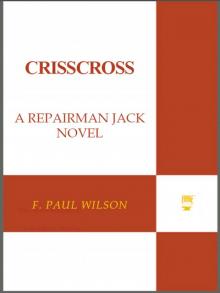 Crisscross
Crisscross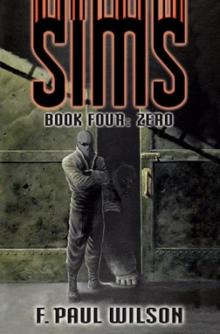 Ground Zero
Ground Zero Short Stories
Short Stories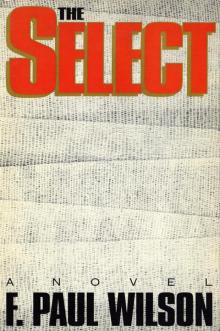 The Select
The Select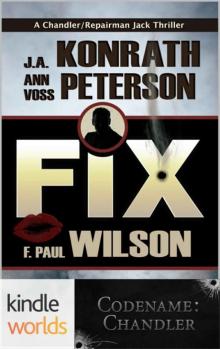 Codename
Codename Bloodline
Bloodline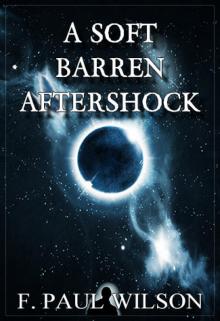 A Soft Barren Aftershock
A Soft Barren Aftershock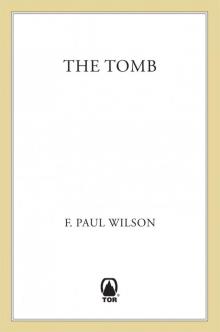 The Tomb
The Tomb The Complete LaNague
The Complete LaNague The Tery
The Tery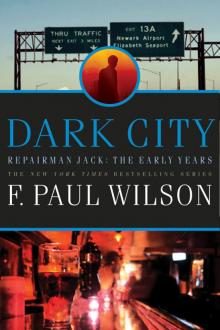 Dark City
Dark City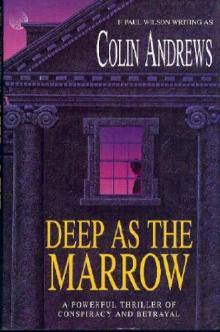 Deep as the Marrow
Deep as the Marrow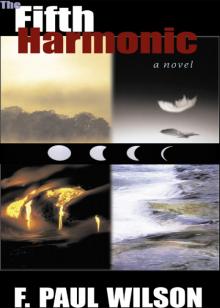 The Fifth Harmonic
The Fifth Harmonic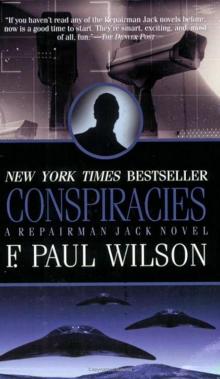 Conspiracies
Conspiracies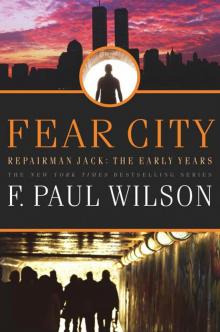 Fear City
Fear City Wheels Within Wheels
Wheels Within Wheels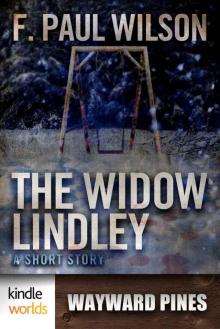 Wayward Pines
Wayward Pines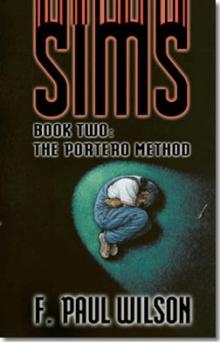 The Portero Method
The Portero Method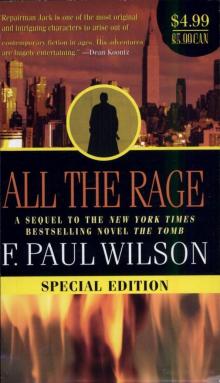 All the Rage
All the Rage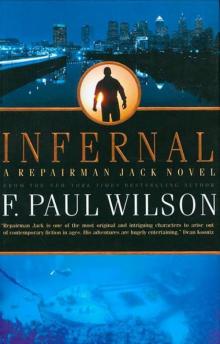 Infernal
Infernal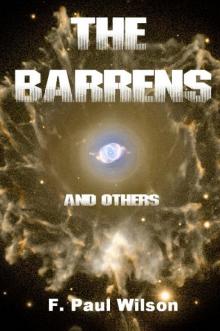 The Barrens & Others
The Barrens & Others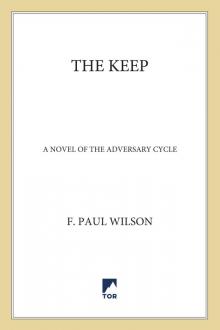 The Keep
The Keep Quick Fixes: Tales of Repairman Jack
Quick Fixes: Tales of Repairman Jack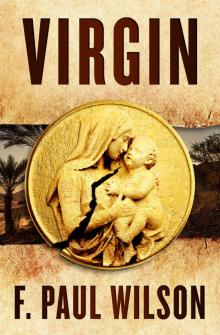 Virgin
Virgin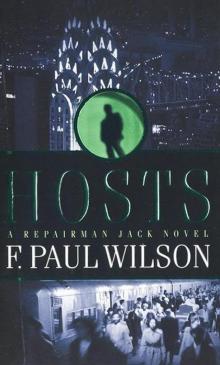 Hosts
Hosts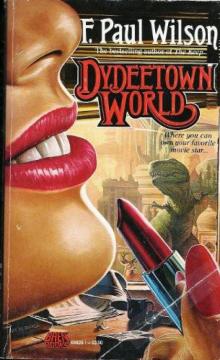 Dydeetown World
Dydeetown World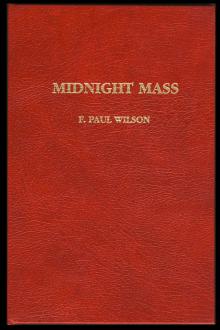 Midnight Mass
Midnight Mass Black Wind
Black Wind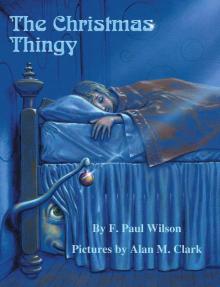 The Christmas Thingy
The Christmas Thingy The Last Rakosh
The Last Rakosh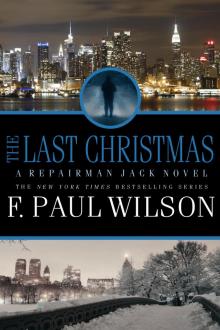 The Last Christmas: A Repairman Jack Novel
The Last Christmas: A Repairman Jack Novel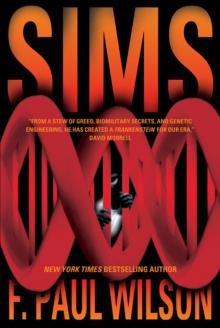 SIMS
SIMS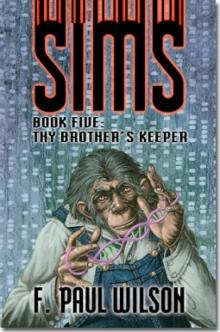 Thy Brother's Keeper
Thy Brother's Keeper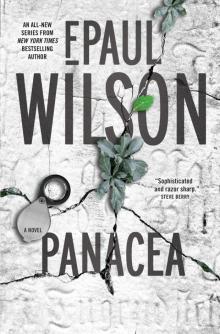 Panacea
Panacea The Touch
The Touch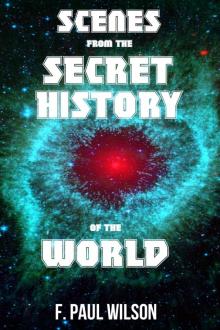 Scenes from the Secret History
Scenes from the Secret History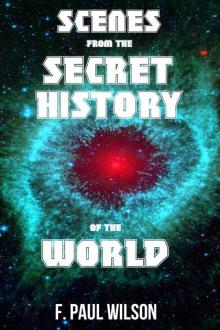 Scenes From the Secret History (The Secret History of the World)
Scenes From the Secret History (The Secret History of the World)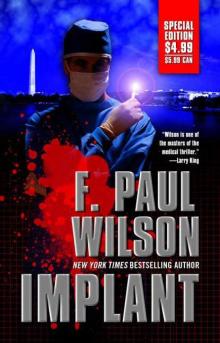 Implant
Implant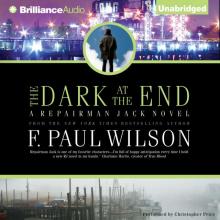 The Dark at the End
The Dark at the End Fatal Error
Fatal Error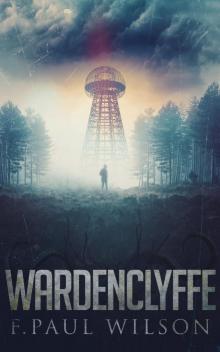 Wardenclyffe
Wardenclyffe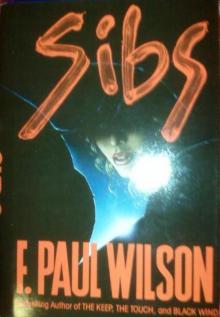 Sibs
Sibs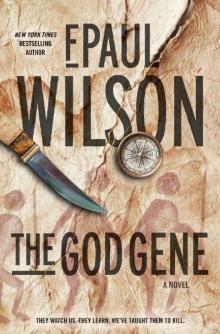 The God Gene
The God Gene The Void Protocol
The Void Protocol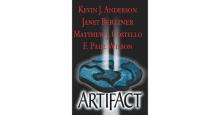 Artifact
Artifact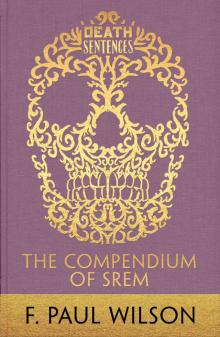 The Compendium of Srem
The Compendium of Srem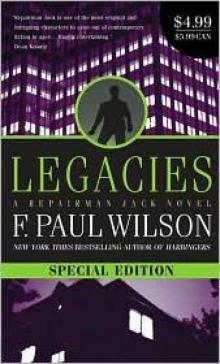 Legacies
Legacies Reprisal
Reprisal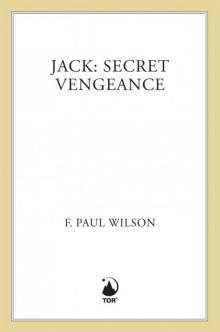 Jack: Secret Vengeance
Jack: Secret Vengeance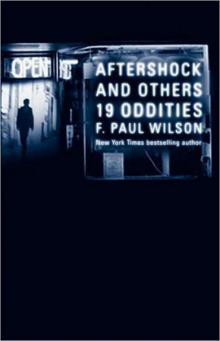 Aftershock & Others: 19 Oddities
Aftershock & Others: 19 Oddities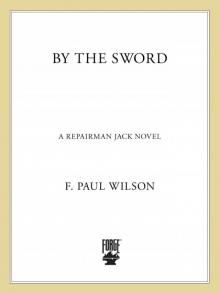 By the Sword
By the Sword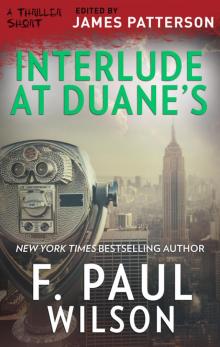 Interlude at Duane's (Thriller: Stories to Keep You Up All Night)
Interlude at Duane's (Thriller: Stories to Keep You Up All Night)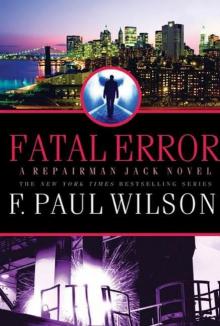 Fatal Error rj-13
Fatal Error rj-13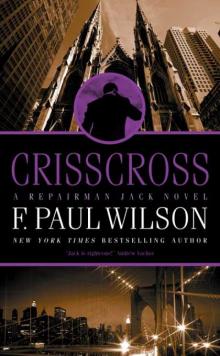 Crisscross rj-8
Crisscross rj-8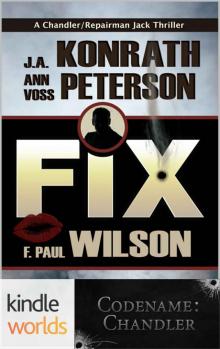 Codename: Chandler: Fix (Kindle Worlds Novella)
Codename: Chandler: Fix (Kindle Worlds Novella)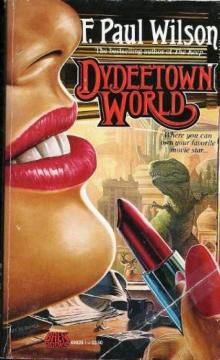 Dydeetown World lf-4
Dydeetown World lf-4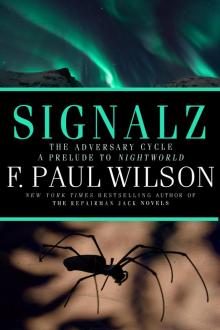 Signalz
Signalz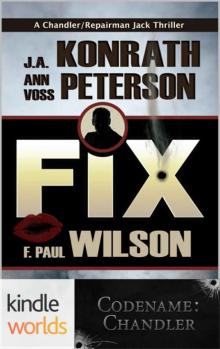 Codename_Chandler_Fix
Codename_Chandler_Fix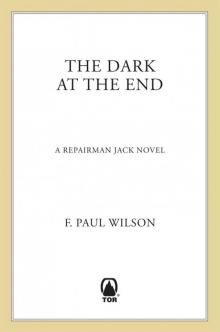 The Dark at the End (Repairman Jack)
The Dark at the End (Repairman Jack)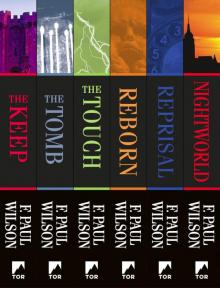 The Complete Adversary Cycle: The Keep, the Tomb, the Touch, Reborn, Reprisal, Nightworld (Adversary Cycle/Repairman Jack)
The Complete Adversary Cycle: The Keep, the Tomb, the Touch, Reborn, Reprisal, Nightworld (Adversary Cycle/Repairman Jack)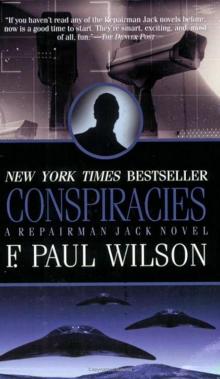 Repairman Jack 03 - Conspiracies
Repairman Jack 03 - Conspiracies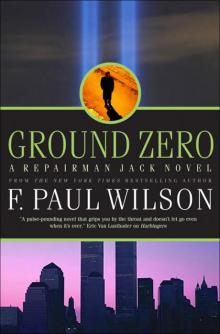 Ground Zero rj-13
Ground Zero rj-13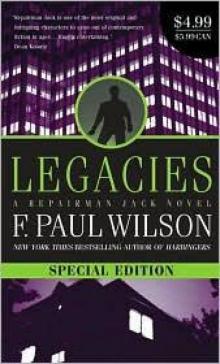 Repairman Jack 02 - Legacies
Repairman Jack 02 - Legacies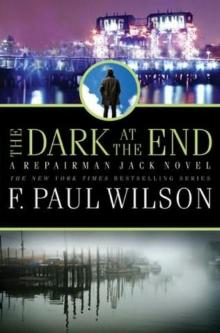 The Dark at the End rj-15
The Dark at the End rj-15![Repairman Jack [02]-Legacies Read online](http://i1.bookreadfree.com/i/03/21/repairman_jack_02-legacies_preview.jpg) Repairman Jack [02]-Legacies
Repairman Jack [02]-Legacies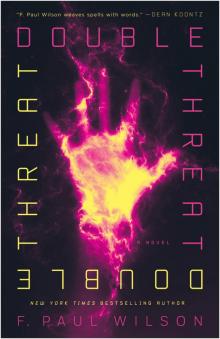 Double Threat
Double Threat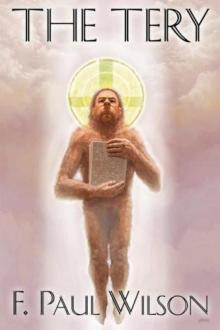 The Tery lf-5
The Tery lf-5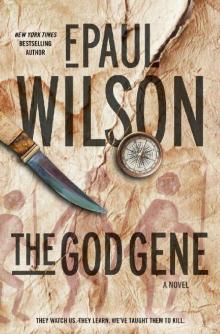 The God Gene: A Novel
The God Gene: A Novel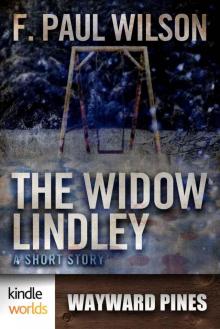 Wayward Pines: The Widow Lindley (Kindle Worlds Novella)
Wayward Pines: The Widow Lindley (Kindle Worlds Novella)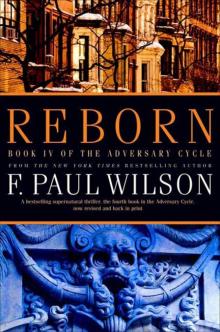 Reborn ac-4
Reborn ac-4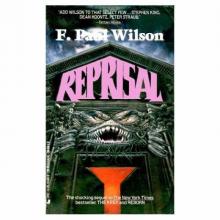 Reprisal ac-5
Reprisal ac-5 New Title 1
New Title 1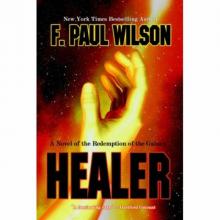 Healer lf-3
Healer lf-3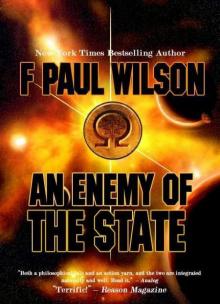 An Enemy of the State lf-1
An Enemy of the State lf-1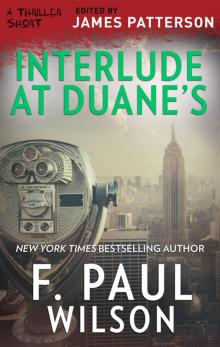 Interlude at Duane's
Interlude at Duane's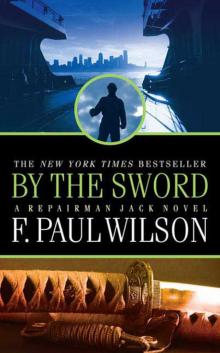 By the Sword rj-12
By the Sword rj-12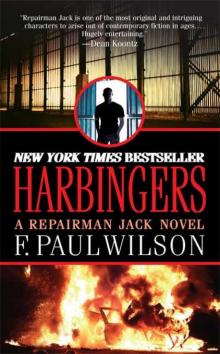 Hardbingers rj-10
Hardbingers rj-10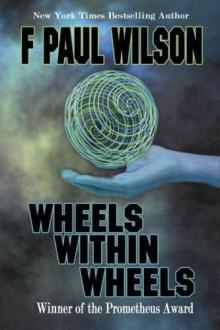 Wheels Within Wheels lf-2
Wheels Within Wheels lf-2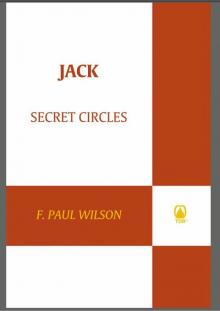 Jack: Secret Circles
Jack: Secret Circles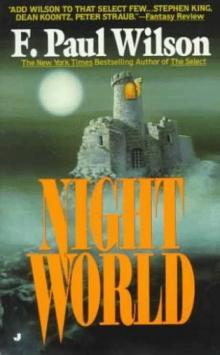 Nightworld ac-6
Nightworld ac-6 Quick Fixes - tales of Repairman Jack
Quick Fixes - tales of Repairman Jack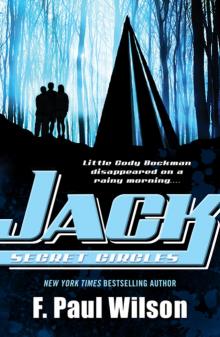 Secret Circles yrj-2
Secret Circles yrj-2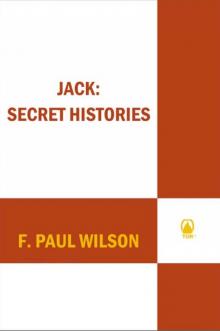 Jack: Secret Histories
Jack: Secret Histories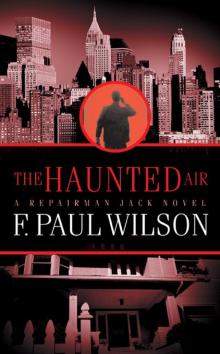 Haunted Air rj-6
Haunted Air rj-6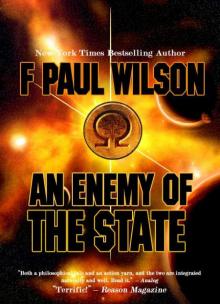 An Enemy of the State - a novel of the LaNague Federation (The LaNague Federation Series)
An Enemy of the State - a novel of the LaNague Federation (The LaNague Federation Series)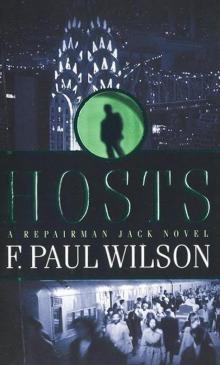 Repairman Jack 05 - Hosts
Repairman Jack 05 - Hosts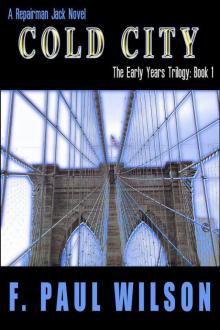 Cold City (Repairman Jack - the Early Years Trilogy)
Cold City (Repairman Jack - the Early Years Trilogy)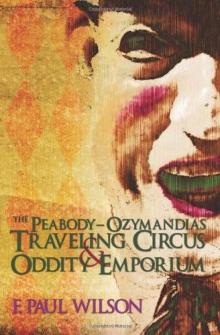 The Peabody-Ozymandias Traveling Circus & Oddity Emporium
The Peabody-Ozymandias Traveling Circus & Oddity Emporium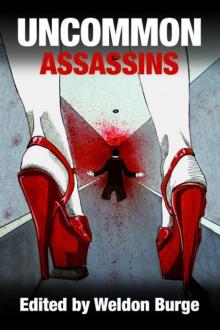 Uncommon Assassins
Uncommon Assassins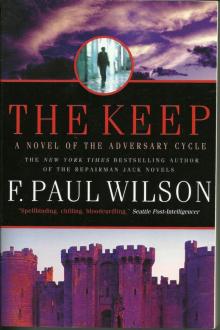 Adversary Cycle 01 - The Keep
Adversary Cycle 01 - The Keep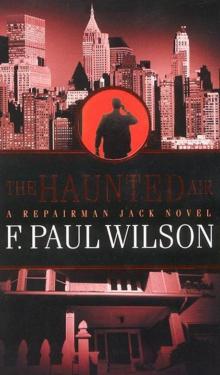 Repairman Jack 06 - The Haunted Air
Repairman Jack 06 - The Haunted Air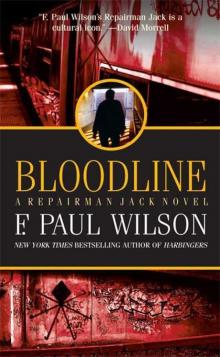 Bloodline rj-11
Bloodline rj-11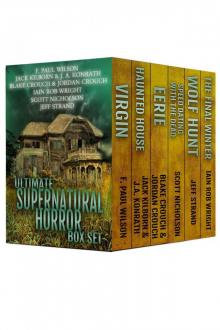 Ultimate Supernatural Horror Box Set
Ultimate Supernatural Horror Box Set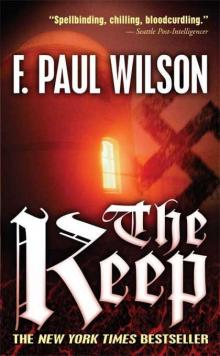 The Keep ac-1
The Keep ac-1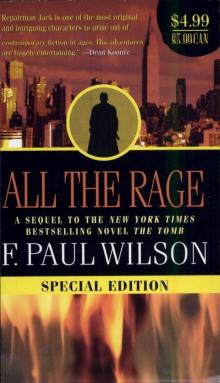 Repairman Jack 04 - All the Rage
Repairman Jack 04 - All the Rage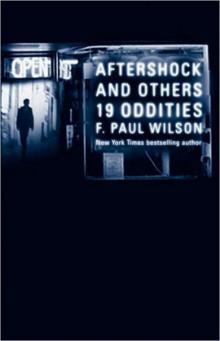 Aftershock & Others
Aftershock & Others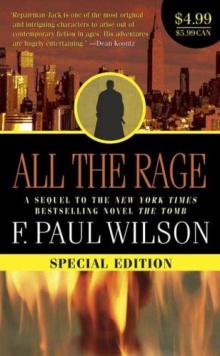 All the Rage rj-4
All the Rage rj-4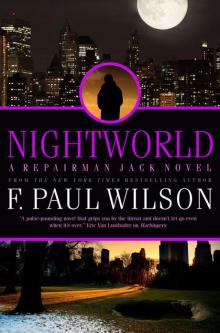 Nightworld (Adversary Cycle/Repairman Jack)
Nightworld (Adversary Cycle/Repairman Jack)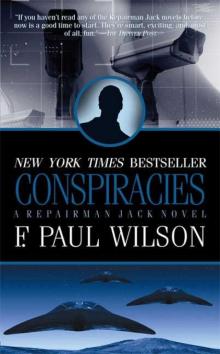 Conspircaies rj-3
Conspircaies rj-3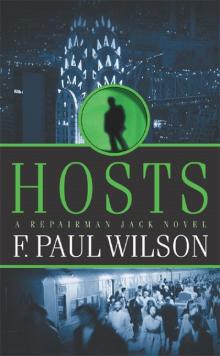 Hosts rj-5
Hosts rj-5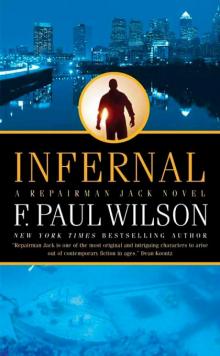 Infernal rj-9
Infernal rj-9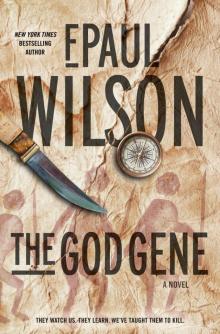 The God Gene: A Novel (The ICE Sequence)
The God Gene: A Novel (The ICE Sequence)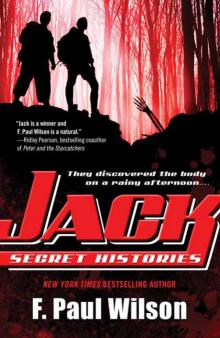 Secret Histories yrj-1
Secret Histories yrj-1